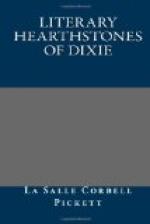While sea and shore and sky and earth were giving him of their best, his father came back with innumerable stories of adventure that would of themselves have set up a young romancer in business. Having talked his mind dry of experiences he returned to Mississippi to make another collection of thrilling tales, leaving William Gilmore, Jr., with a mental outlook upon life which the glories of Charleston could never have opened to him.
Drugs, considered as a lifelong pursuit, did not appeal to the youth who had been writing verses ever since he had arrived at the age of eight years and now held a place in the poet’s corner of a Charleston paper. He went into the law office of his friend, Charles E. Carroll, where his perusal of Blackstone was interspersed with reading poetry and writing Byronic verses.
While thus variously engaged he received an invitation to visit his father in the wilds of Mississippi, a call to which his adventurous spirit gave willing response. Were there not Indians and other wild things and the choicest assortment of the odds and ends of humanity out there, just waiting to be made useful as material for the pen of an ambitious romancer? Through untrodden forests he rode in a silence broken only by his horse’s feet and the howl of wolves in the distance. To all the new views of the world he kept open the windows of his mind and they were transmitted to his readers in the years to come. If he did not sleep with head pillowed upon the grave of one of De Soto’s faithful followers, he at least thought he did, and the fancy served him as the theme of verse. And those varying types of human nature and beast nature—do they not all appear again upon the printed page?
When the end of his visit came his father pleaded:
“Do not think of Charleston. Whatever your talents they will there be poured out like water on the sands. Charleston! I know it only as a place of tombs.”
There came a time when he, too, knew it only as a place of tombs. Just now he knew it as the home of the Only Girl in the world, so—what was the use? And then, Charleston is born into the blood of all her sons, whether she recognizes them or not. It is better to be a door-keeper in Charleston than to dwell in the most gorgeous tents of outside barbarians. So he who was born to the Queen City would hang on to the remotest hem of her trailing robe at the imminent risk of having his brains dashed out on the cobble-stones as she swept along her royal way, rather than sit comfortably upon velvet-cushioned thrones in a place unknown to her regal presence. Simms came back to his native city with her “unsociable houses which rose behind walls, shutting in beautiful gardens that it would have been a sacrilege to let the public enjoy.”




